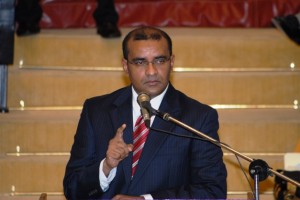By Samuel Sukhnandan
As the Caribbean Community continues to face great challenges in agriculture with an already high food importation bill, former President Bharrat Jagdeo is calling on regional governments to work towards forging greater political support for the agriculture sector. The former Guyanese leader was addressing participants at the “Jagdeo Initiative” seminar, held at the Guyana International Conference Centre on Friday, as part of activities to mark GuyExpo 2012.




